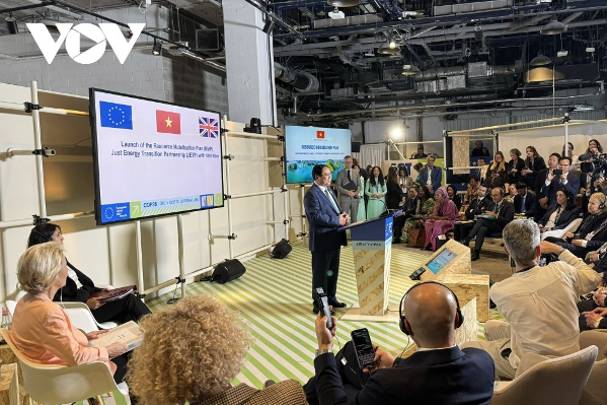According to the National Steering Committee for Implementing Viet Nam's Commitments at COP26, since the 4th session in July 2023, the government and the Prime Minister have issued numerous mechanisms, policies, strategies, plans, and projects to fulfill Viet Nam's pledges at COP26.
Strengthening institutions and policies
The government has submitted the National Marine Spatial Plan to the National Assembly for approval and introduced decrees on mechanisms for direct electricity purchases, adjustments to retail electricity prices, and incentives for rooftop solar energy, aiming to boost renewable and clean energy development in the medium to long term.
The Prime Minister has approved various strategies, including the Hydrogen Energy Development Strategy, the National Energy Development Strategy, the Automotive Industry Development Strategy, the National Energy Master Plan, the Action Plan to implement Power Plan VIII, and the National Action Plan for transitioning to a transparent, responsible, and sustainable food system. Other significant projects include the Just Energy Transition Partnership (JETP) and its resource mobilization plan for COP28, the Sustainable Development of one million hectares of high-quality, low-emission rice production in the Mekong Delta, and initiatives to enhance forest quality to protect ecosystems and mitigate natural disasters.
The government has also released essential lists, such as critical national energy projects, facilities using significant energy, and greenhouse gas-emitting sectors requiring emissions inventory. Additionally, directives on carbon credit management have been issued.
 Launching Ceremony of Viet Nam's JETP Resource Mobilization Plan at COP 28 (Dubai, 2023)
Launching Ceremony of Viet Nam's JETP Resource Mobilization Plan at COP 28 (Dubai, 2023)
Actions toward net zero goals
Beyond policy development, Viet Nam has worked closely with international partners to enhance access to financial and technological resources, creating more opportunities for low-carbon growth and promoting a just energy transition. Ministries and agencies have pursued various tasks and solutions, achieving significant results since the 4th session of the COP26 Steering Committee.
To implement COP26 commitments, domestic and international banks in Viet Nam have collaborated with the government to provide green services and loans to support green transitions and a just energy transition. State-owned enterprises have led in researching and developing new energy sources, promoting digital and green transformations in management, and reducing greenhouse gas emissions through energy and material savings.
Local authorities have organized the implementation of greenhouse gas reduction tasks, gradually working towards net-zero emissions by 2050. Provinces and cities have encouraged businesses to conduct emissions inventories, reduce emissions, and develop waste-to-energy plants and energy-saving public lighting systems. Major towns have expanded electric bus services and public bicycle networks, while some localities are participating in carbon emission reduction programs.
The implementation of the Just Energy Transition Partnership (JETP) and the Asia Zero Emissions Community (AZEC) initiatives has been actively promoted. Viet Nam has developed a resource mobilization plan for JETP, which was announced by the Prime Minister at COP28. This plan includes 37 investment projects in existing programs and plans, 181 proposed investment projects seeking funding, 61 technical support projects suggested by domestic and international partners, and 10 project ideas from the International Partners Group (IPG) and the Glasgow Financial Alliance for Net Zero (GFANZ).
To implement AZEC, Vietnamese ministries have collaborated with Japan to propose working groups to promote green transition, enhance public-private cooperation, and partner with the Japan Bank for International Cooperation (JBIC) to establish a platform for AZEC-Green Transition projects. Japan has proposed 82 energy projects across various categories and is working with the Ministry of Industry and Trade on implementation.